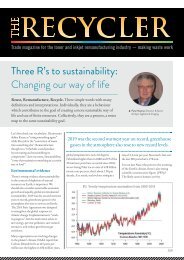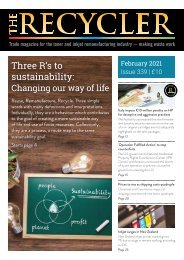The Recycler Issue 317
Create successful ePaper yourself
Turn your PDF publications into a flip-book with our unique Google optimized e-Paper software.
FEATURE<br />
LOVE ME TENDER: Government tenders, continued<br />
guaranteed income, and even make<br />
hiring decisions based upon it. <strong>The</strong><br />
income generated by government<br />
tenders is also from a reliable source,<br />
meaning you can relax, to a certain<br />
degree, knowing it can be relied upon.<br />
<strong>The</strong> awarding of a government<br />
tender also increases the value of a<br />
company, so in the event that you ever<br />
wish to sell your company, they can be<br />
extremely beneficial. It also means you<br />
can pass on a ready-to-go contract<br />
to your buyers, which is another<br />
tempting proposition for anyone<br />
looking to invest in your company. In<br />
the event of obtaining loans or credit,<br />
should you require it, a business with a<br />
government contract is also viewed as<br />
a strong, reliable company.<br />
Counting a government department<br />
amongst your clients will also boost the<br />
profile of your business, and make it<br />
more attractive for other potential<br />
partners, as well as giving it an image<br />
of trustworthiness and dependability.<br />
Tenders like these can potentially<br />
open doors, and lead to further<br />
opportunities, whether with other<br />
government tenders or just other<br />
businesses keen to network with a<br />
government-endorsed company. Just<br />
one contract could lead to dozens of<br />
others and place your company on a<br />
real pedestal.<br />
Even without the financial<br />
motivations, there is value: A<br />
phenomenon known as “loss leader<br />
tendering” is becoming increasingly<br />
prevalent, which involves bidding for<br />
tenders that you know will make a<br />
small, or even negligible, profit for<br />
your company; however, although<br />
financially there may be no reward, if<br />
your company can comfortably “take<br />
the hit” these tenders can still help<br />
your business in the long term, in<br />
terms of access to the new market,<br />
building a new business relationship<br />
with a particular client, or generating<br />
positive new publicity for your<br />
business.<br />
<strong>The</strong> potential barriers, and how to<br />
overcome them<br />
However, it is not always such plain<br />
sailing, particularly with regards to<br />
government tenders for products and<br />
services involving things like printing<br />
consumables and cartridges. In many<br />
cases, swayed by dubious claims made<br />
by OEMs, government agencies will<br />
insist that any cartridges must be OEM,<br />
or at the least, new build, closing a<br />
significant door on the aftermarket<br />
community.<br />
Laura Heywood, Chair of the United<br />
Kingdom Cartridge Remanufacturers<br />
Association (UKCRA), has been<br />
outspoken on the issue. Heywood, who<br />
previously welcomed British MP Simon<br />
Danczuk to her company Kleen<br />
Strike to discuss the difficulties<br />
remanufacturers face in competing for<br />
tenders, complained in 2014 that new<br />
build clone cartridges were being<br />
considered in tender offers by public<br />
bodies, simply on the basis of their<br />
lower costs, despite having “no place in<br />
the transition towards a greener<br />
economy.”<br />
However, in recent years there has<br />
been evidence that the wind of public<br />
opinion is changing, and as the world<br />
wakes up to the hazards posed to life on<br />
earth by the plastic waste pandemic<br />
[see <strong>The</strong> <strong>Recycler</strong> <strong>Issue</strong> 308] calls for<br />
government tenders to embrace reuse,<br />
and remanufacturing, are growing<br />
louder. This is in part thanks to the<br />
work of bodies like ETIRA, the<br />
European toner and inkjet remanufacturers’<br />
association, which has been<br />
lobbying for many years on behalf<br />
of the aftermarket community,<br />
particularly in fighting against<br />
exclusionary tenders that shut out<br />
remanufacturers, which it has said it<br />
does “almost every week.” <strong>The</strong> body<br />
has previously called these tenders “a<br />
regular nuisance for ETIRA members,”<br />
recognising the issue is also a<br />
hindrance to other remanufacturers<br />
outside of its membership, and<br />
a worryingly regressive approach<br />
environmentally.<br />
This lobbying has borne fruit, with<br />
multiple victories being celebrated<br />
after the trade association’s efforts. In<br />
2014, for example, ETIRA successfully<br />
took action against a hospital tender in<br />
southern Germany, which was open<br />
to “OEM and new-build non-OEM<br />
cartridges, but explicitly excluded<br />
remanufactured cartridges.” <strong>The</strong><br />
following year, a similar case involving<br />
another southern German hospital<br />
was won by the trade association,<br />
while a public tender from a “major<br />
city” in the north of the country<br />
was withdrawn after ETIRA pressure,<br />
with new, fairer tenders published<br />
in its place.<br />
This may initially seem like an uphill<br />
struggle, and even with the weight of<br />
public consciousness behind it, ETIRA<br />
has a difficult task in changing minds<br />
at the top levels. Its typical process<br />
involves the sending of what it terms<br />
“a protest letter,” explaining that<br />
the exclusion of remanufactured<br />
cartridges is illegal, and reminding the<br />
public body issuing the tender that<br />
“they should be careful when<br />
including new-build toner cartridges<br />
in the tender, as it could make them<br />
liable for possible infringement of OEM<br />
patents by these models.” ETIRA also<br />
regularly reiterates that many newbuild<br />
toner cartridges “have no end-oflife<br />
solution, and as a result they may<br />
wind up in landfills, polluting the<br />
European environment”.<br />
Reflecting at the time on its success,<br />
the trade association called the<br />
withdrawal of the exclusionary<br />
tenders “another example of ETIRA’s<br />
successful lobbying for a level playing<br />
field for our trade.” Furthermore,<br />
in January 2014, the European<br />
Parliament updated European Union<br />
law so that any government tenders<br />
were required to “take social and<br />
6 THE RECYCLER • ISSUE <strong>317</strong> • APRIL 2019

















